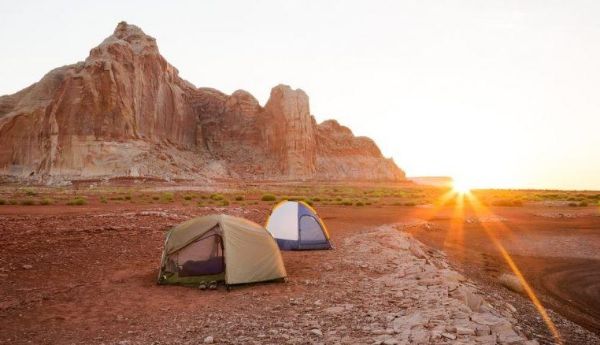Camping is a wonderful way to connect with nature and experience the great outdoors. However, camping in extreme heat can present unique challenges and safety concerns.
In this article, we will explore essential tips and strategies to help you stay cool, comfortable, and safe during your hot weather camping trips. From preparation and gear selection to hydration and emergency readiness, we’ve got you covered.

Table of Contents
Understanding the Impact of Heat
Extreme heat can take a toll on your body, leading to dehydration, heat exhaustion, and even heatstroke. It’s crucial to understand the signs and symptoms of heat-related illnesses to protect yourself and your camping companions.
Identifying Symptoms of Heat Exhaustion and Heatstroke
- Fatigue, dizziness, and nausea
- Excessive sweating and rapid heartbeat
- Muscle cramps and headache
- Confusion and disorientation
Knowing When to Seek Immediate Medical Attention
- High body temperature (above 104°F or 40°C)
- Unconsciousness or seizures
- Hot, dry skin (lack of sweating)
Preparing for Hot Weather Camping
Being well-prepared is essential to ensure a safe and enjoyable camping experience in extreme heat.
Choosing the Right Campsite
- Look for shaded areas or campsites near water sources.
- Avoid low-lying areas or places with minimal airflow.
Essential Gear for Hot Weather Camping
- Lightweight and breathable tents
- High-quality sleeping bags and moisture-wicking sleeping pads
- Portable shade structures or tarps
- Cooling towels and misting fans
- Solar-powered camping gadgets
Packing the right gear can make a significant difference in your comfort and well-being during hot weather camping.
Hydration: The Key to Survival
Staying properly hydrated is crucial when camping in extreme heat. Dehydration can sneak up on you quickly, so it’s essential to drink plenty of fluids throughout the day.
Water: The Best Hydration Source
- Carry an ample supply of water and consider water purification methods.
- Drink water consistently, even if you don’t feel thirsty.
- Avoid excessive consumption of sugary or caffeinated beverages.
Electrolytes: Replenishing Essential Minerals
- Include electrolyte-rich drinks or supplements to replenish lost minerals.
- Consume foods high in electrolytes, such as fruits and vegetables.
Heat-Beating Strategies During the Day
Maximize your comfort and minimize the risk of heat-related illnesses by adopting specific strategies during the daytime.
Staying Cool with Water-Based Activities
- Take refreshing dips in nearby lakes, rivers, or swimming holes.
- Set up a camp near natural water sources for easy access.
Seeking Shade and Taking Frequent Breaks
- Utilize natural shade from trees or bring portable shade structures.
- Take regular breaks to rest and cool down in shaded areas.
Incorporating these strategies into your daily routine will help you stay cool and comfortable while enjoying your camping adventures.
Dressing for Hot Weather Camping
Choosing the right clothing can significantly impact your comfort level and protect you from the sun’s harmful rays.
Lightweight and Breathable Clothing
- Opt for loose-fitting, moisture-wicking fabrics like cotton or linen.
- Wear light-colored clothing to reflect sunlight.
Sun Protection Essentials
- Don a wide-brimmed hat to shield your face and neck.
- Wear sunglasses with UV protection to protect your eyes.
- Apply sunscreen with a high SPF rating.
Emergency Preparedness and Safety Measures
Creating an Emergency Plan
- Familiarize yourself with the campground’s emergency procedures.
- Carry a fully stocked first aid kit and know how to use it.
- Communicate your camping plans with a trusted person who can check on you.
Monitoring Weather Conditions
- Stay updated on weather forecasts and heat advisories.
- Be prepared to modify or postpone your camping trip if necessary.
Knowing When to Rest and Retreat
- Pay attention to your body’s signals and take breaks when needed.
- Retreat to cooler areas or air-conditioned shelters if heat becomes unbearable.
Conclusion
Camping in extreme heat can be challenging, but with proper preparation and a focus on safety, you can still enjoy your outdoor adventures. Remember to stay hydrated, seek shade, and monitor your body for signs of heat-related illnesses. By following the tips and strategies outlined in this article, you’ll be better equipped to tackle the hottest of camping conditions.
FAQs (Frequently Asked Questions):
Q: Can I use a portable air conditioner or fan while camping?
A: While it’s possible to use portable cooling devices, it’s important to consider power sources and the additional weight and space they require.
Q: Are there any specific foods or drinks that can help me stay cool?
A: Foods with high water content, such as watermelon and cucumbers, can help hydrate your body. Additionally, drinking cool herbal teas or fruit-infused water can provide a refreshing boost.
Q: Is it safe to camp alone in extreme heat?
A: Camping alone in extreme heat can be risky. It’s advisable to camp with a group or inform someone about your plans and check-in regularly.
Q: How do I protect my electronic devices from heat damage?
A: Keep your electronic devices away from direct sunlight and store them in insulated containers or coolers when not in use. Avoid exposing them to excessive heat for extended periods.
Remember, camping in extreme heat requires caution and awareness. Always prioritize your safety and well-being. Enjoy your outdoor adventures while staying cool and protected!
(Note: This article is for informational purposes only and should not substitute professional medical or camping advice. Always consult with experts or authorities for specific concerns and situations.)